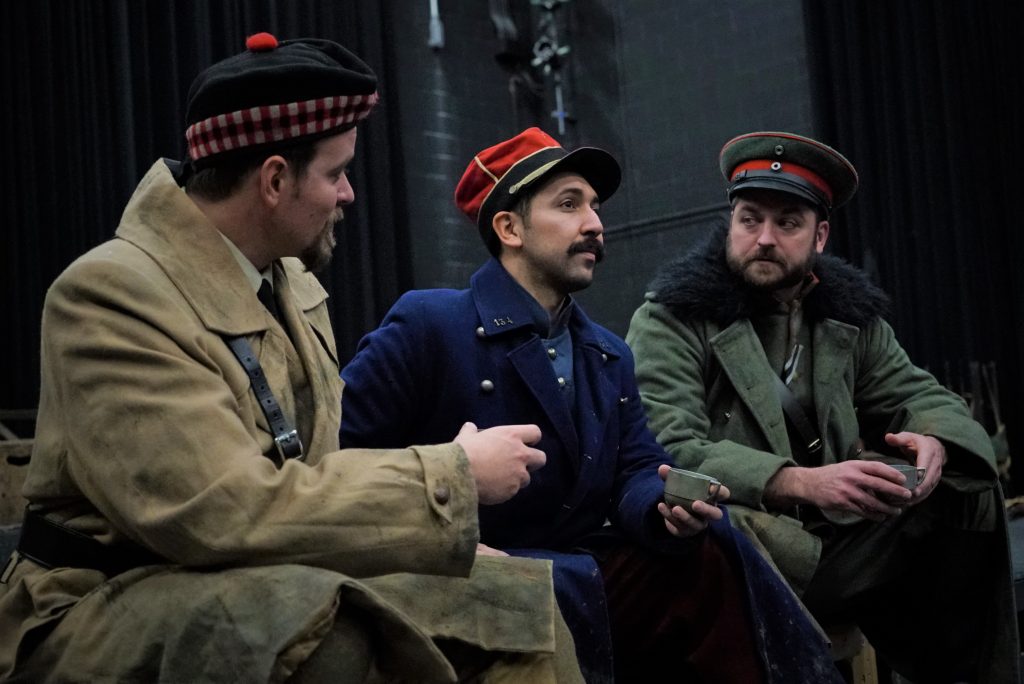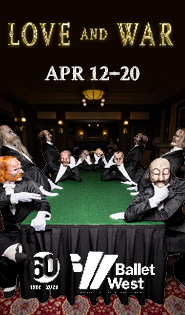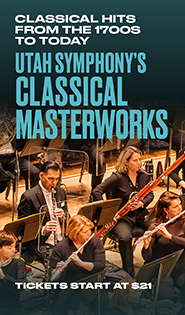Utah Opera brings war and peace to the stage with “Silent Night”

So — here’s a spoiler — no one sings “Silent Night” in Silent Night.
One of the opera’s stars, baritone Craig Irvin, thinks he knows why: Including the beloved carol would take the audience out of the sound world created for this reimagining of a real-life Christmas truce in World War I, Irvin said in an interview.
The composer, Kevin Puts, offered his own reason: While the opera’s title evokes the song, Puts said in an interview, it is more broadly about “a night without bombs.”
On that night in 1914, peace broke out in the middle of a war when soldiers from Germany, France and the United Kingdom met in no man’s land to share treats, games and songs. The dramatization of that brief armistice by Puts and librettist Mark Campbell opens Saturday at Utah Opera.
Based on the Oscar-nominated film Joyeux Noël, the opera follows several characters. Irvin is Lt. Horstmayer, the “good German” who is laser-focused on keeping his men alive. Other roles include Nikolaus Sprink and Anna Sørensen, opera singers in a romantic relationship who are reunited for a Christmas Eve concert near the Western Front; Scottish brothers William and Jonathan Dale, and their priest, Father Palmer; the French Lt. Audebert, who leaves behind a pregnant wife; and Audebert’s barber and aide-de-camp, Ponchel.
There are more than a dozen principals, and a chorus twice that number, yet “you feel like you know each one,” said baritone Daniel Belcher, who plays Ponchel.
“Mark’s dramaturgical line is so good,” Belcher said of the librettist. “It’s shocking at times, and also quite amusing. But when he needs to hit you in the gut, he does it with a rather ferocious punch.”
The opera contains highly realistic visual and sound effects as well as combat violence, but it isn’t all brutality and gloom.
“In some ways, there’s a lot of weight on my character to bring light and joy to these men who have not seen a beautiful thing in six months,” soprano Abigail Rethwisch, who plays Anna, said during a rehearsal break at the Capitol Theatre.
“We’ve added a great deal of humor,” Campbell said in a phone interview from New York. “We won’t bludgeon you with the sorrow of the story. These people are humans—including the Germans. … It’s not an anti-war piece. It’s a pro-peace piece.”
He finds the opera’s message hopeful despite the inevitable resumption of hostilities. After all, the event actually happened. Although the warring generals rejected Pope Benedict XV’s plea for a Christmas truce, soldiers made one spontaneously. That tells Campbell that “there’s always the possibility of peace.”
Silent Night was Puts’ first opera, and the veteran librettist Campbell marveled at how the composer “got to the heart of the story so quickly and brilliantly. … He understands musical storytelling in his bones. It was such a joyful collaboration.” Campbell and Puts have written two more operas together since.
In a sit-down at the company’s Salt Lake City headquarters, Belcher, Irvin and conductor Robert Tweten echoed Campbell’s praise of Puts’ score.
“It’s a very fulfilling piece,” Tweten said. “It’s the kind of music that just gets people in the gut.”
Irvin, who originated the role of Horstmayer and is now singing it for the eighth time, described one favorite moment: an interlude, less than a minute long, in which night turns to day.
“The first time I heard the orchestra play it my jaw literally dropped,” he said. “You can hear the frost melt on the grass, the birds fly away.”
Another highlight is the “Sleep” chorus, in which all the soldiers sing of their loved ones at home, with stage designer Erhard Rom’s triple-decker set letting the audience look into all three trenches simultaneously. Three languages and three key signatures all at once? Only in opera, company artistic director Christopher McBeth noted, could this make sense.
“It’s like a Seurat painting: Don’t look at the dots,” McBeth said.

Puts, speaking by phone from New York, said his biggest challenge might have been writing music to fit the cadences of German, a language he doesn’t know: “I had someone speak and record the lines and I listened over and over.”
Campbell made the rest of the composer’s task easy, Puts said.
“He wrote the libretto first, and the structure was so brilliantly worked out that the music came easily,” he said. “He gave me a lot of room to do what I had experience doing: painting a musical picture with an orchestra.”
The composer said he had fun writing music to evoke the disparate cultures — German Lieder, Scottish ballads, French carols — and what he called an “Ivesian mashup” for the battlefield. Tweten and Irvin agreed that if you didn’t know better, you’d think the tunes the soldiers sing in their Christmas Eve exchange were actual folk songs, but they’re all original.
Artistic director McBeth has been a fan of Silent Night since he saw the first outline of the piece more than a decade ago, but the Capitol Theatre’s pit wasn’t big enough to accommodate Puts’ orchestral forces. With the theater’s recent renovation, and with Puts offering a slightly slimmed-down score that McBeth predicts will entice many more regional companies, that obstacle has been cleared.
McBeth is also pleased to present Silent Night as the latest in a 10-year run of contemporary works at Utah Opera including Mark Adamo’s Little Women, Jake Heggie’s Moby-Dick, Daniel Catán’s Florencia en el Amazonas and Rachel Portman’s The Little Prince.
“Some people are calling this the golden age of contemporary opera,” Campbell said. “It would not be if not for companies like Utah Opera. Christopher McBeth has done an excellent job of cultivating audiences. New opera is not scary—it’s relevant to our lives.”
Utah Opera’s production of Silent Night plays Jan. 18–26 at the Capitol Theatre. utahopera.org; 801-355-2787.
Composer Kevin Puts and librettist Mark Campbell will have a Q&A before a free screening of Joyeux Noël, the Oscar-nominated film on which their opera is based, on Friday, Jan. 17, at 5:30 p.m. at the Sandy branch of the Salt Lake County Library.

